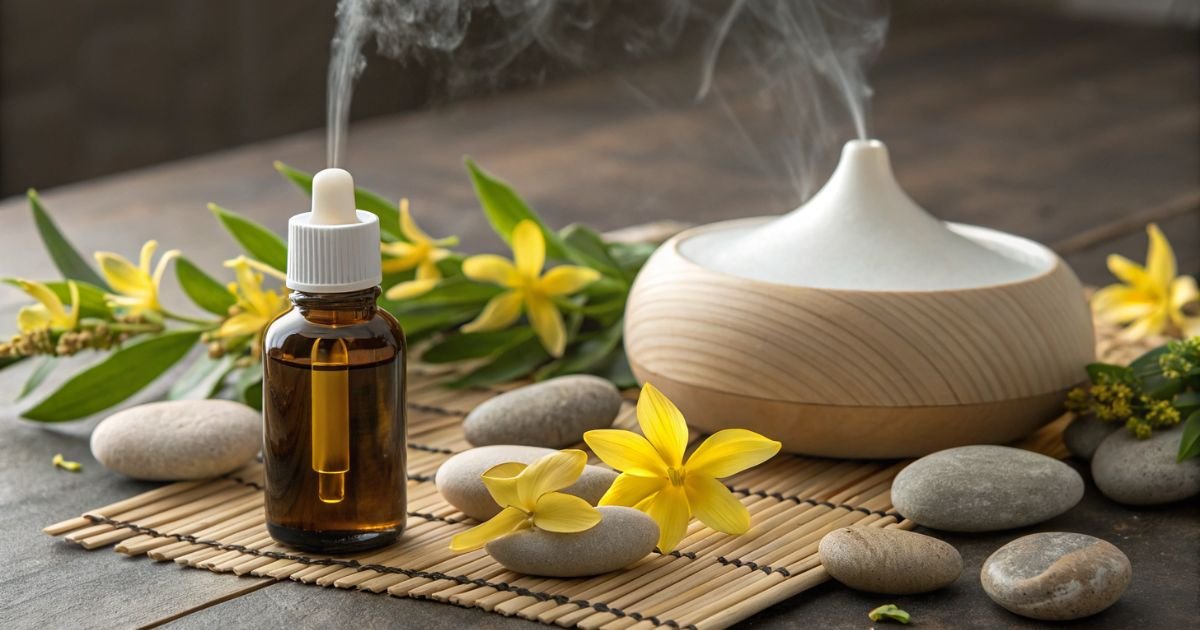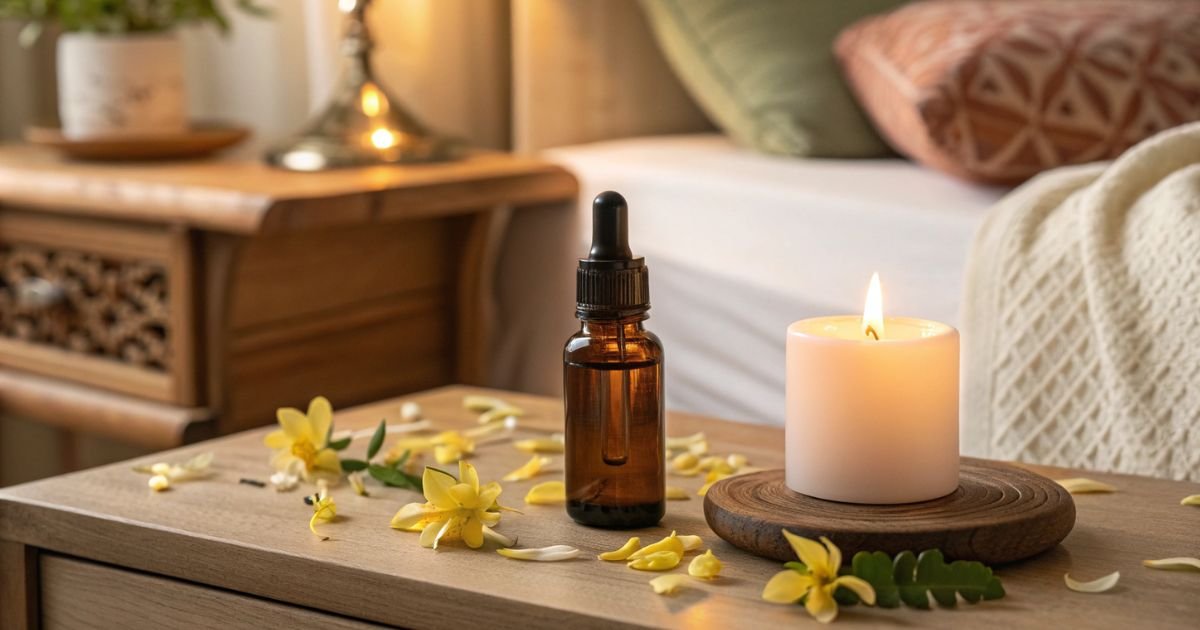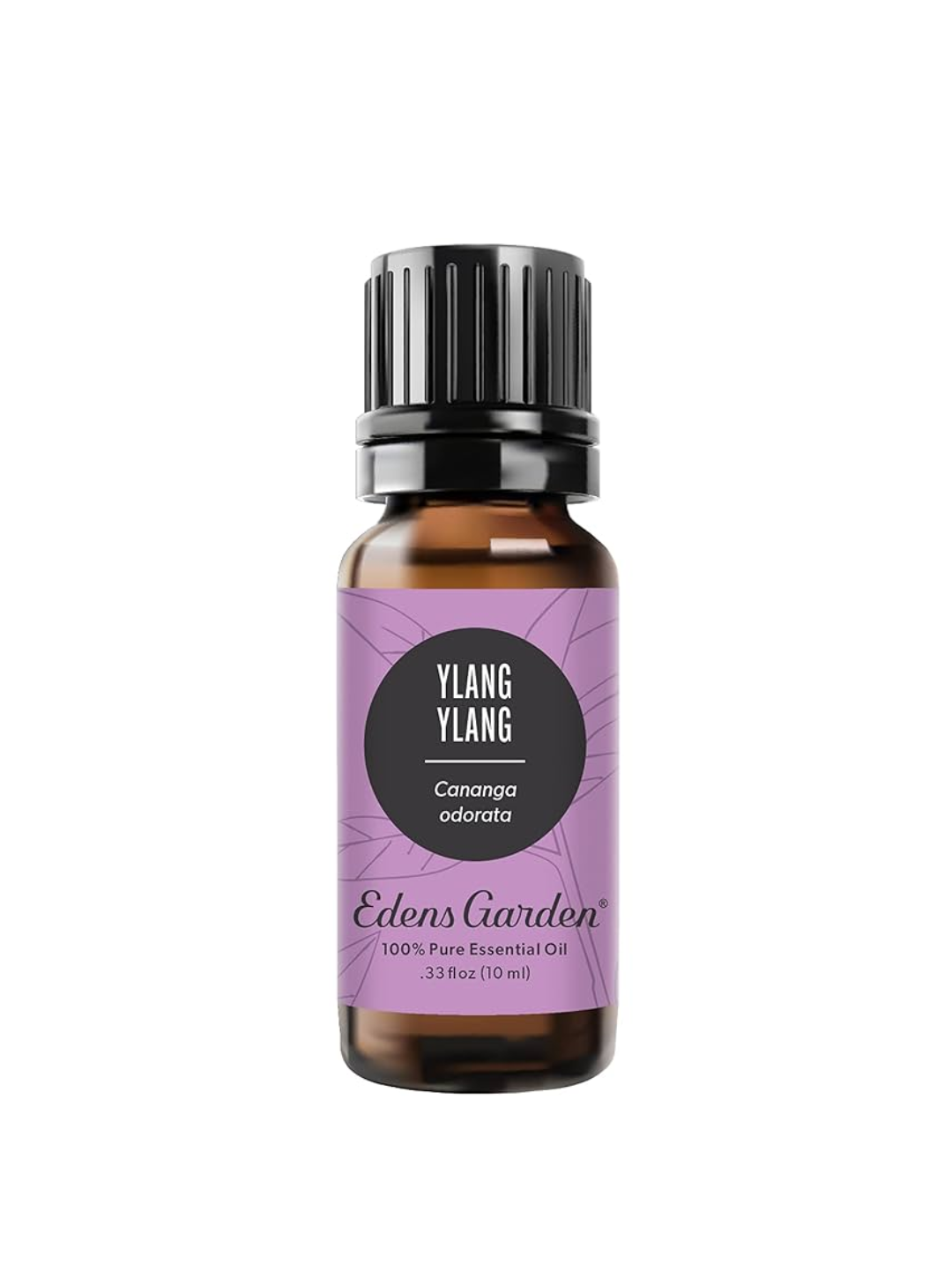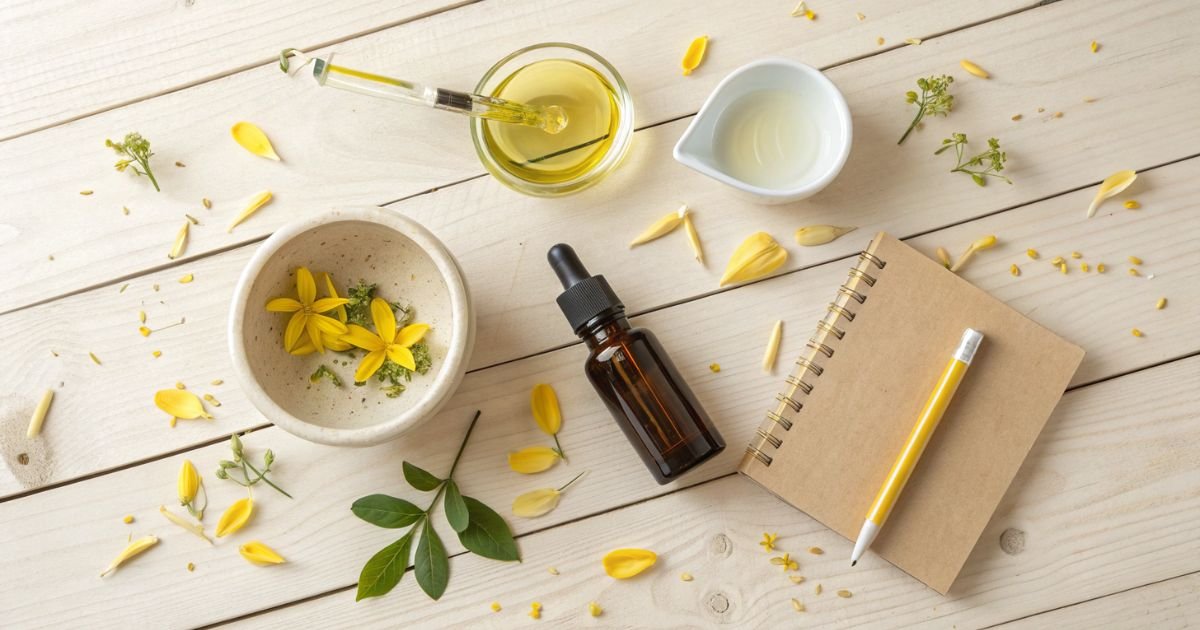Ylang ylang essential oil captivates with its rich, floral aroma and versatile wellness potential. It has been traditionally used in aromatherapy, skincare, and natural wellness practices worldwide. This versatile oil offers calming effects that help reduce stress and promote relaxation. A 2013 clinical study showed that inhaling the aroma of ylang ylang significantly lowered both blood pressure and heart rate in healthy men. This article will discuss the benefits of Ylang ylang essential oil and how to use it in more detail. Let’s dive in.
Compounds of Ylang Ylang Essential Oil

Ylang ylang essential oil contains various bioactive compounds that contribute to its therapeutic and aromatic properties.
1. Linalool
Linalool is a naturally occurring terpene alcohol found in ylang ylang oil. It has a floral, slightly spicy aroma. Linalool is known for its calming and anti-anxiety effects. It may also possess anti-inflammatory and analgesic properties. This compound contributes to the oil’s soothing and relaxing qualities.
2. Geranyl Acetate
Geranyl acetate is an organic monoterpene ester present in ylang ylang oil. It has a bright, floral aroma. Geranyl acetate exhibits antimicrobial and anti-inflammatory activities. It also contributes to the oil’s pleasant fragrance. This compound plays a role in skin care applications.
3. Benzyl Acetate
Benzyl acetate is an organic ester found in ylang ylang oil. It has a sweet, fruity aroma reminiscent of jasmine. Benzyl acetate is used in perfumes and cosmetics for its pleasant scent. It also has potential antimicrobial properties. This compound enhances the oil’s aromatic profile.
4. Geraniol
Geraniol is a monoterpene alcohol present in ylang ylang oil. It has a rose-like, sweet floral aroma. Geraniol exhibits antimicrobial and antioxidant activities. It may also have anti-inflammatory properties. This compound contributes to the oil’s therapeutic and aromatic characteristics.
5. Beta-Caryophyllene
Beta-caryophyllene is a sesquiterpene found in ylang ylang oil. It has a spicy, woody aroma. Beta-caryophyllene is known for its anti-inflammatory and analgesic effects. It also interacts with cannabinoid receptors, contributing to its therapeutic properties. This compound adds depth to the oil’s scent profile.
Health Benefits of Ylang Ylang Essential Oil

Ylang ylang essential oil has multiple health benefits. Some of them are:
1. Stress Reduction & Relaxation
Ylang ylang essential oil is celebrated for its relaxing properties, which help calm the mind and body effectively. Research shows that inhaling it significantly reduced cortisol levels and improved mood among participants. A study with forty subjects revealed decreased stress markers and increased relaxation, confirming its natural stress-relieving potential.
2. Cardiovascular Support
This essential oil offers measurable benefits for cardiovascular function, especially blood pressure and heart rate. A clinical trial with 29 healthy men demonstrated significant systolic and diastolic blood pressure reductions after inhalation. Participants also reported greater relaxation, highlighting its dual impact on emotional calmness and cardiovascular balance.
3. Antioxidant & Antibacterial Activity
Ylang ylang essential oil contains potent antioxidant compounds that protect cells from oxidative stress and aging. Research further confirms its antibacterial effects against multiple bacterial strains.
One laboratory study highlighted potent radical-scavenging activity combined with notable bacterial inhibition, emphasizing its role in promoting cellular protection and overall immune defense.
4. Skin & Sebum Balance
This oil is often applied topically to improve skin balance and clarity. It helps regulate sebum production, preventing excessive oil buildup and breakouts. Research indicates that ylang ylang essential oil soothes inflammation, supports healing, and promotes youthful skin. Its natural balancing effect makes it beneficial for oily and aging skin.

Edens Garden Ylang Ylang- Complete Essential Oil
100% Pure Premium Grade, Undiluted, Natural, Therapeutic, Aromatherapy, The Best for Diffuser, Face, Candle, Laundry 10 ml (.33 fl oz)
Experience the soothing, floral aroma of Edens Garden Ylang Ylang Essential Oil. 100% pure and therapeutic grade, it promotes relaxation, uplifts mood, and supports skincare, delivering natural wellness without fillers, synthetics, or harmful chemicals.
How to Use Ylang Ylang Essential Oil
You can use Ylang Ylang essential oil in many ways to support wellness through scent and touch. Such as:
Diffusion / Aromatherapy
In a diffuser, add 3–5 drops of ylang ylang oil per 100 mL of water. Let it run for about 30–60 minutes. The aroma disperses into the air, promoting relaxation and calming effects. Studies confirm that inhaling ylang ylang reduces blood pressure and heart rate in healthy men.
Topical Application & Massage
Always dilute ylang ylang in a carrier oil (e.g., jojoba, sweet almond) at 1–2%. Then massage onto skin, concentrating on pressure points or tense muscle areas. The oil can absorb and exert calming effects while nourishing skin. Clinical use of transdermal ylang ylang lowered stress markers in subjects.
Bath / Soaking
Add 3–6 drops of ylang ylang to a warm bath (fill ~ with tepid water). Mix with Epsom salt or carrier oil before adding. Soak for 15–20 minutes to breathe in the scent and allow skin absorption. This method supports mood balance and enhances the calming effects of the oil.
Personal Inhaler / Direct Inhalation
Put 1–2 drops of ylang ylang on a tissue, cotton ball, or aromatherapy inhaler stick. Inhale gently when feeling stressed, anxious, or fatigued. This quick method gives an immediate aromatic dose. It may help normalize heart rate and mood in minutes.
Risks and Side Effects of Ylang Ylang

Despite the benefits of ylang ylang essential oil, it is important to be aware of potential risks and side effects. Understanding these can help ensure safe and effective use.
- Ylang ylang oil may cause allergic reactions in some individuals.
- Skin irritation, such as redness or rash, can occur, especially in sensitive individuals.
- Prolonged or excessive use might lead to headaches or nausea.
- It can lower blood pressure; those with hypotension should use it cautiously.
- Pregnant or breastfeeding women should consult a healthcare provider before use.
- Always perform a patch test before topical application to check for skin sensitivity.
- Avoid direct sunlight exposure after topical application, as it may increase photosensitivity.
- Keep out of reach of children; accidental ingestion can be harmful.
- Use diluted ylang ylang oil; undiluted application can cause skin irritation.
- Consult a healthcare professional if you have underlying health conditions before using ylang ylang oil.
What Does Ylang Ylang Essential Oil Smell Like?
Ylang ylang essential oil offers a rich, sweet, and exotic floral aroma. Its fragrance is often described as creamy, with hints of custard, jasmine, banana, and honey. The scent is both romantic and complex, featuring subtle notes of neroli and a slight powdery undertone. This unique blend makes ylang ylang a cherished ingredient in perfumery and aromatherapy.
Can I Apply Ylang Ylang Essential Oil Directly to Skin?
No, ylang ylang essential oil should not be applied directly to the skin without dilution. It is highly concentrated and may cause skin irritation or allergic reactions. Always dilute it with a carrier oil, such as jojoba or coconut, before topical use. To ensure skin compatibility, perform a patch test 24 hours before complete application.
Does Ylang Ylang Make You Sleepy?
Yes, ylang ylang essential oil may help promote sleep by reducing stress and anxiety. Research indicates that its calming effects can improve sleep quality. Inhaling ylang ylang oil has been shown to lower blood pressure and cortisol levels, which are associated with relaxation and better sleep. Combining it with other oils like lavender and bergamot may enhance its sleep-inducing benefits.
Read More: Sandalwood Essential Oil: Benefits & Uses
Conclusion
Ylang ylang essential oil offers many benefits, from stress relief to skin and hair care. It can enhance relaxation, mood, and overall wellness when used safely. Always follow proper dilution and safety guidelines to maximize results. Explore its versatile uses to enjoy both aromatic and therapeutic effects, making ylang ylang a valuable addition to your holistic health routine.

